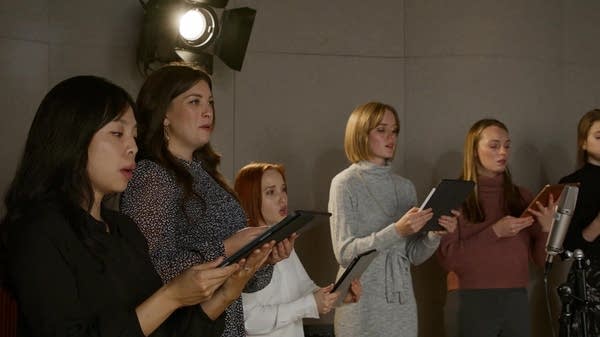So you're sailing down the Pacific Coast Highway in your 1964 Ford Mustang convertible (with the top down, of course), and "Blue Moon," sung by the Marcels, comes on the radio. What do you do? C'mon — admit it — you sing along with the bass line!
You can hear it, can't you? Bomp-baba-bomp, bomp-bomp-baba-bomp. Melody? Ha! Who needs melody with a bass line like that? It's so good, the melody doesn't even make an appearance until that bass line is burned into your ears. In spite of yourself, you sing along with that bass. You can't help it. Why? Because singing bass, especially in a choir, is awesome! Impressive! Wonderful!
Face it, in the world of opera (and I love opera; I made my living for a number of years as a solo operatic performer), the bass is always the villain. Or the old man. Or the priest. Or the old priest who happens to be a villain. In other words, the bass never gets the girl. The tenor gets the girl — even the baritone. But never the bass.
In the world of choral music, though — that's another world entirely.
But don't take my word for it. Urban Dictionary, that paragon of veracity, puts it like this:
bass (singer): This refers to basses in choir. Not the musical instrument or the fish.
A bass in [a] choir is a man that sings in the lowest range. The kind of man whose voice seems to literally make the stage vibrate with its low, resonant, reverberating and rich sound quality. The kind of man who kicks baritone and tenor arses collectively. The kind of man who adds depth to any choir song.
Basses, unlike tenors and baritones, are actually capable of getting an alto to become interested in them. We altos are rather selective and demanding when it comes to men, and the only men that can catch our eyes are basses. Basically, while the sopranos are standing there swooning over the tenors, the basses are hitting it off with the altos.
Oh, and one more thing — basses are living, breathing, walking, talking sex under stage lights. They exude masculinity. They're talented and confident. They're basically pure and unbridled sex.
Goodness. Bet you weren't expecting that, were you?
Now that I have your attention, there are three irrefutable facts about singing bass in a choir:
1. As a bass, you will never stand in the front row of the choir. This may explain why we don't always watch the conductor.
2. As a bass, you will become very familiar with the musical concept of tonic and dominant.
3. As a bass, you are expected to provide a running commentary of snarky comments during rehearsals, what with being situated in the back row and all.
Plus, when you sing second bass, you always know where your part is on the page: bottom of the system or bottom of the page. Even a bass can follow his line when it's always in the same place!
Granted, it's not all Skittles and beer in the back row. Things can tend to get a little tedious sometimes, in a I-IV-V-I sort of way. True, the bass section often is the foundation of the harmonic structure of a piece (in addition to being the foundation of the sound of the ensemble), but singing the choral equivalent of the bass line from the Pachelbel Canon is tiresome, to say the least.
But then there are those times when the basses get to shine. Sometimes we even get the melody! I never cease to be amazed what wonderful things composers continue to come up with, all from the same twelve chromatic tones. Those twelve tones have been used for centuries, yet new combinations continue to be created. From simple to complex, beautiful to tortured, the well never seems to run dry. Thank goodness.
Of all the pieces I have sung, however, perhaps the most vocally rewarding for this second bass would have to be the Rachmaninoff Vespers (All-Night Vigil). When it comes to music in which basses can show off, you can't do much better than that of the Russian Orthodox Church, music of which many consider the Vespers to be the pinnacle. The second bass part spans two octaves and a perfect fourth (low B flat to E flat above middle C) — a rather high degree of difficulty, to put it mildly. But my favorite measures of the entire piece are the final two in Movement 5, the Nunc Dimittis. They contain a simple descending scale that just happens to finish on a sustained low B flat, the one located two ledger lines below the bass clef, for those of you scoring at home.
While I was a member of the Dale Warland Singers, we took the Vespers on tour through the Southern United States. One of the performances was at Spivey Hall, the wonderful concert hall on the campus of Clayton State University, outside Atlanta. It's an incredible performance space, with marvelous acoustics: an ideal setting for a cappella choral music.
You have to keep in mind that a low B flat is a fickle friend for those of us who stand in the back row. Low E? Bring it on! Low D? No problem! Low C? Usually nothing to it! But low B flat? Definitely a fair-weather friend. On that tour there happened to be three or four of us who could usually produce something, so we wouldn't embarrass the section too much, but on this night the planets were in alignment. We approached the end of the movement. Our colleagues in the tenor and alto sections were whispering on a unison B flat an octave above us. The baritones, having finished their moving line in the previous measure, joined us and sustained the B flat an octave below the altos and tenors.
And the second basses started our descent. B flat, A flat, G flat — the score is marked perdendosi, which seems almost cruel, but we did want to crescendo as we moved toward the final cadence — low F, low E flat, low D flat — eighth notes now, but we're also slowing a bit, so — low C and then, low B flat. We arrived. All of us! The entire back row was singing a low B flat! I didn't want it to end! It was one of those moments that, as it's happening, you can't believe it. You want to stop for a moment just to take it all in.
After the cutoff, the room was deathly quiet. It was as if no one wanted to move, fearful of breaking the mood. And then it happened. Just before Dale gave the downbeat to begin Movement 6, a gentleman in the audience grasped what we — the back row — had done. (Okay, the rest of the choir had done a phenomenal job, too, but throw me a bone here!)
Remember, this is in Spivey Hall. Incredible acoustics and all. With a mixture of reverence, awe, disbelief, and (dare I say it?) envy, he whispered one word.
"S--t."
Best. Review. Ever.
For a bass, it doesn't get much better than that. To move someone to the point of uttering a profanity (and in a good way), that's about the highest compliment that can be paid to a bass. We bring our lunch pails, stand in the back row, and, as a friend of mine once put it, start laying pavement. Get to work. No flashy high notes, nothing fancy, but we get the job done. It sure beats working for a living.
Oh, and one more thing about being a bass: don't forget that conductors always refer to the bass section as the men. That's why they always say, "Men, let's start at measure 47. And add the tenors this time."
You didn't think I was going to finish this without at least one dig at the tenors, did you?
Jim Ramlet is perhaps one of a handful of people on the planet who have performed all of the choral works of Austrian composer Anton Webern. In spite of that, he still enjoys singing in vocal groups: eight seasons with the Dale Warland Singers, and ten seasons as a member of the VocalEssence Ensemble Singers. As a solo operatic performer, he has sung more than 40 roles with the Lyric Opera of Chicago, Houston Grand Opera, Santa Fe Opera, Vienna State Opera, Washington National Opera, and many others. He has also been seen on the stages of the Guthrie Theater, the Children's Theatre Company, History Theatre, Frank Theatre, and the American Repertory Theater.
Love the music?
Show your support by making a gift to YourClassical.
Each day, we’re here for you with thoughtful streams that set the tone for your day – not to mention the stories and programs that inspire you to new discovery and help you explore the music you love.
YourClassical is available for free, because we are listener-supported public media. Take a moment to make your gift today.









